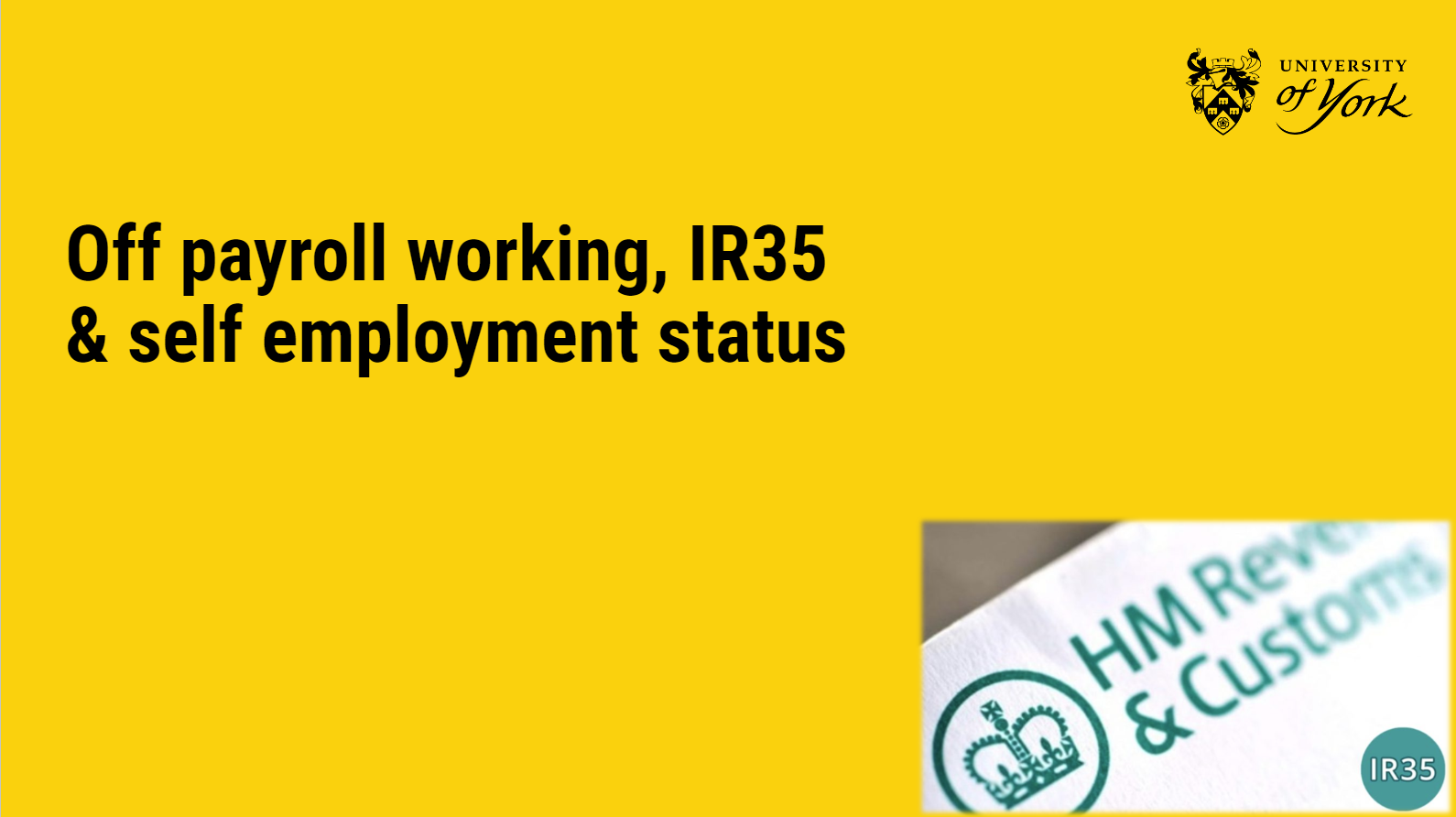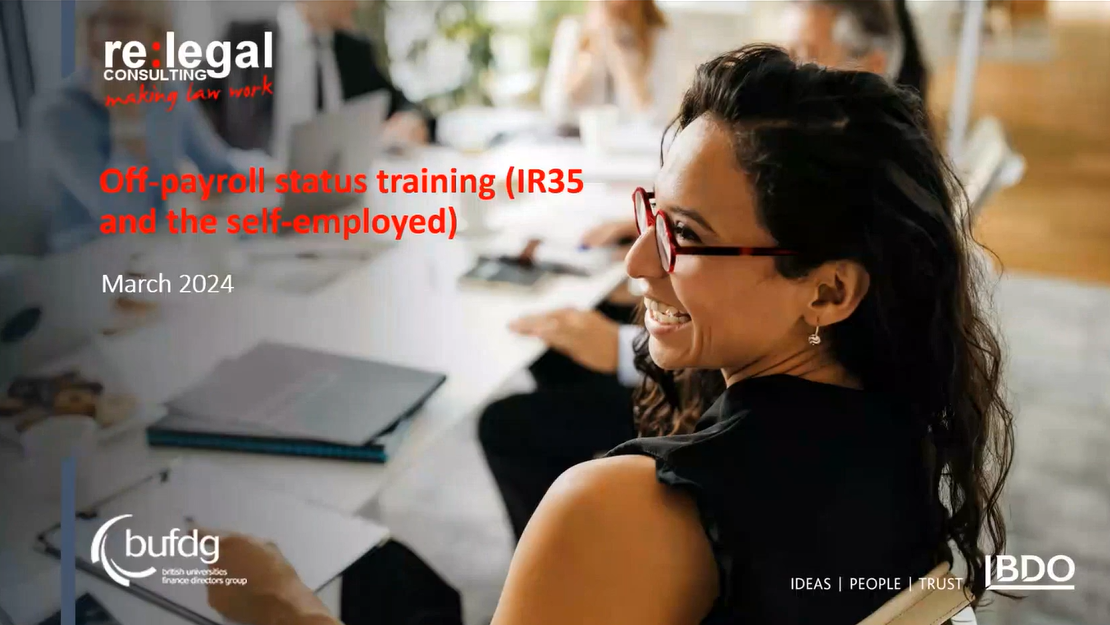Off payroll (IR35) and self employment
General off-payroll (IR35) and self-employment FAQs
Why is the employment status check (IR35 process) necessary?
As public sector bodies, universities are legally required to comply with HMRC's off-payroll working rules (IR35). The check ensures that individuals who perform work more akin to an employee are taxed correctly, even if they operate through a personal service company (PSC) or as a sole trader. The University is liable for heavy fines and any unpaid taxes if it fails to comply.
What is the process for determining status?
The standard process involves the department or engaging manager completing the ESS or employment status service form, which is then used by the payroll to perform the official CEST assessment.
When must a status check be performed?
A formal employment status check (using CEST or an equivalent assessment) must be undertaken before any work commences for:
- All new suppliers who are individuals, partnerships, or personal service companies (PSCs).
- All new engagements for existing suppliers, especially if the nature of the work has changed.
- All sole traders providing services.
What happens after the determination?
- If "outside IR35" (self-employed/contract for services): The University issues a status determination statement (SDS) confirming the status. The individual/company is paid gross (without the deduction of PAYE and NICs) upon invoice.
- If "inside IR35" (deemed employee): The University issues an SDS confirming the status. Payment must be made through the university payroll, with PAYE (income tax) and NICs deducted from the fee. This tax classification does not confer actual employment rights.
Is there an appeal process?
Yes. Workers can appeal the determination (the SDS) by submitting a formal appeal to a designated finance or payroll team, including their reasons for disagreement. The University must review the determination and respond within a statutory timeframe.
Employment Status Survey (ESS)
An employment status service (ESS) form (internal to UoY) must be completed by the department planning to use a personal service company or an individual to undertake work on a self-employed basis.
This should be completed by the hiring/engagement manager, not the administrator, as they will have a bigger picture/clearer idea as to what the proposed relationship entails.
Once the form is completed, the payroll team will complete the check employment status test (CEST) based on the ESS, which will provide the formal HMRC result.
Common types of work that require an ESS check
The list below details common types of work that fall under the scope of this rule and require an ESS/CEST check. The list is not exhaustive, and if your type of work is not stated below, it might still require an ESS check in line with the other guidance.
Common roles requiring an ESS Check
- Academic and Teaching: guest speakers, guest lectures, guest tutors, lecturers (short-term/occasional), researcher.
- Consultancy and Design: IT consultant, consultant drafting a policy, consultant designing course material, copywriting, graphic design, animation design.
- Professional Services: IT consultant, careers advice, audio producer, auditor, counsellor, illustrator.
- Medical and Examination: clinical examiners (practical or written exam), simulated patient, educational supervision for medical students.
- Other Services: actors, artists, music performers for a concert, fitness instructor, language interpretation (including sign language interpreter), photographer.
Important information about former employees
If an ex-employee is engaged to do similar work they were previously employed to do, it is considered a high-risk IR35 scenario. It is highly unlikely the individual will be deemed genuinely self-employed, as the working relationship is too similar to the previous one. This scenario will almost certainly require a formal ESS check and is frequently determined to be Inside IR35 (paid via payroll with deductions).
What do you need to do?
Process to follow
- Reflect upon the nature of the relationship - seek advice from payroll if required
- Refer to legal services for a specific contract for either Agency/Consultancy/Personal Services
- Refer to the procurement team to understand the commercial and operational risks of the engagement
- If the tests are met, the CEST/ESS must be completed by the recipient of the services, in order to determine if off-payroll, employment and tax legislation applies
- Once the form is submitted, payroll will be notified. The CEST tool will be used to determine the outcome
- Payroll will email a confirmation of the outcome - either to put the individual onto the payroll, or to set them up as a supplier
- Follow instructions provided by Payroll in the outcome email
- If the outcome is to set up as a supplier, you will need to also raise a new supplier request, providing details of the checks you've already performed
- The individual and their company then get issued the SDS (Status Determination Statement) and the contract which should have a unique reference number
- The purchase requisition should now be raised, with the contract and reference number directly referenced on the purchase requisition
- An annual review should be done, if the relationship occurs over a reasonable length of time
Appeal process
If the worker disagrees with the result of the status check, they can appeal to the Director of Finance (or their nominated senior manager) by emailing employment-status
- Name
- Company name (if applicable)
- Reasons they believe the determination is incorrect
- Contact information
A response will be issued within 45 days of receiving notification of the appeal.
Supporting resources
Key contacts
If you have a question or need further support, please contact either Procurement or Payroll:


